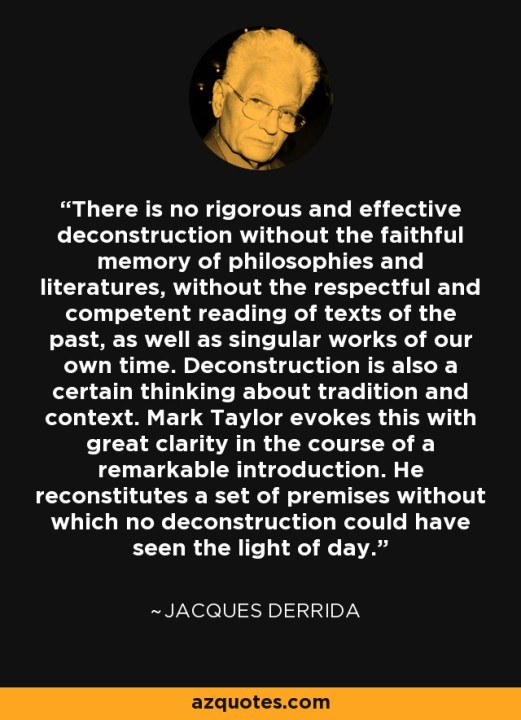
#Deconstruction for #IDIOTS
The Deconstruction of Justice
“The poet…is the man of metaphor: while the philosopher is interested only in the truth of meaning, beyond even signs and names, and the sophist manipulates empty signs…the poet plays on the multiplicity of signifieds.” #Derrida
#Deconstruction #Theory
Jacques #Derrida (1930–2004) was the founder of “deconstruction,” a way of criticizing not only both literary and philosophical texts but also political institutions. Although Derrida at times expressed regret concerning the fate of the word “deconstruction,” its popularity indicates the wide-ranging influence of his thought, in #philosophy, in literary criticism and theory, in art and, in particular, architectural theory, and in political theory. Indeed, Derrida’s fame nearly reached the status of a media star, with hundreds of people filling auditoriums to hear him speak, with films and televisions programs devoted to him, with countless books and articles devoted to his thinking. Beside critique, Derridean deconstruction consists in an attempt to re-conceive the difference that divides self-consciousnes (the difference of the “of” in consciousness of oneself). But even more than the re-conception of difference, and perhaps more importantly, deconstruction attempts to render justice. Indeed, deconstruction is relentless in this pursuit since justice is impossible to achieve.
#Deconstruction and The Possibility of #Justice
Even though justice is impossible and therefore always to come in or from the future, justice is not, for Derrida, a Kantian ideal, which brings us to the third aporia. The third is called “the urgency that obstructs the horizon of knowledge” (Deconstruction and the Possibility of Justice). Derrida stresses the Greek etymology of the word “horizon”: “As its Greek name suggests, a horizon is both the opening and limit that defines an infinite progress or a period of waiting.” Justice, however, even though it is un-presentable, does not wait. A just decision is always required immediately. It cannot furnish itself with unlimited knowledge. The moment of decision itself remains a finite moment of urgency and precipitation. The instant of decision is then the moment of madness, acting in the night of non-knowledge and non-rule. Once again we have a moment of irruptive violence. This urgency is why justice has no horizon of expectation (either regulative or messianic). Justice remains an event yet to come. Perhaps one must always say “can-be” (the French word for “perhaps” is “peut-être,” which literally means “can be”) for justice. This ability for justice aims however towards what is impossible.
The principle that defines #deconstruction
Each time that I say ‘deconstruction and X (regardless of the concept or the theme),’ this is the prelude to a very singular division that turns this X into, or rather makes appear in this X, an impossibility that becomes its proper and sole possibility, with the result that between the X as possible and the ‘same’ X as impossible, there is nothing but a relation of homonymy, a relation for which we have to provide an account…. For example, here referring myself to demonstrations I have already attempted …, gift, hospitality, death itself (and therefore so many other things) can be possible only as impossible, as the im-possible, that is, unconditionally
#Death and #Deconstruction
Then, that is the subject, while recalling that we do not know what it is, if and when it happens, and to whom. ... The dream of deconstruction, a convulsive movement to have done with death itself. Not to put into question again the question, what is death? when and where does it take place? etc. What comes afterward? and so forth. But to deconstruct death. Final period. And with the same blow, to come to blows with death and put it out of action. No less than that.
“No less than that. Death to death”: This shows us that perhaps even more than justice deconstruction values (if we can speak of a moral value) life more than anything else. But, this life is not unscathed; it is life in its irreducible connection to death.
Thus what deconstruction values is #survival.
Quotes I like ..
“The poet…is the man of metaphor: while the philosopher is interested only in the truth of meaning, beyond even signs and names, and the sophist manipulates empty signs…the poet plays on the multiplicity of signifieds.” #Derrida
https://plato.stanford.edu/entries/derrida/#Dec
note: this is not an article as much as it is a construction towards #justice